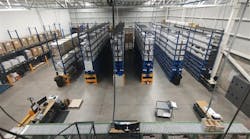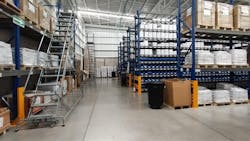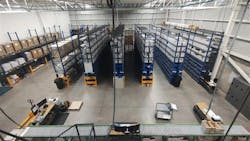Mexico’s Boom: The New Hub for U.S. Manufacturers
Amid ongoing global supply chain uncertainties, geopolitical tension, and sanctions, a growing number of U.S. companies strategizing expansion are nearshoring on Mexico as their manufacturing and industrial hub of choice.
The move in search of sustained service and product output, initially thought only feasible as an enterprise, is quickly gaining traction among small, medium, and commercial-size businesses as an economically viable expansion.
More Localized Production Strengthens Supply Chains
The vulnerabilities of a long and complex global supply chain exposed by the COVID-19 pandemic and the harsh lessons that came along with it are leading companies to move production hubs closer to home in countries such as Mexico. This is as businesses across revenue brackets prioritize supply chain flexibility, visibility, and security over profits from distant offshoring.
For industrial players, nearshoring in Mexico means quicker and cheaper transportation and lead times of products and goods, resulting in more efficient inventory management. Mexico also offers U.S.- and Canadian-based businesses an added advantage through alignment on friendly cross-border trade agreements like the United States-Mexico-Canada Agreement (USMCA), ratified under a stable local political landscape. These factors alone make offshoring to other nations, such as China and Vietnam, less appealing.
Additionally, cultural and time zone similarities between Mexico, the U.S., and Canada make collaboration between teams less challenging. Problem solving becomes easier without significant language and communication barriers, ensuring efficiency and uninterrupted operations.
READ MORE: Nearshoring Gains Attention as Supply Chain Issues Linger
Mexico Offers Skilled, Cost-Effective Workforce
A significant pull for U.S. manufacturers toward Mexico is the growing abundance of skilled labor available at a lower cost than hired onshore. Mexico’s effective education system, increasing English proficiency, and the government’s focus on engineering and developing skilled talents make assimilating into manufacturing facilities and similar workforce environments much quicker.
In addition, government-regulated wages create an achievable entry barrier for smaller businesses to transition to Mexico.
These reforms focused on digital transformation, talent development, and ensuring conducive working environments have resulted in wins on both sides. As employee retention rates increase, nearshoring companies are assured of operational continuity.
Substantial savings are also achievable when production volume is maintained or increased with qualified professionals at a lower cost. Additionally, free trade agreements like the USMCA simplify cross-border trade and transportation of goods, adding to the economic advantages of nearshoring out of Mexico.
READ MORE: Bosch Rexroth Begins Production at New Manufacturing Facility in Mexico
Developed Infrastructure and Conducive Business Ecosystem Aids Goods Transport
Further enhancing supply chain continuity is Mexico’s extensive and well-developed transportation and logistics infrastructure. Highways, railways, ports, airports, and designated special economic zones (SEZs) are at optimum operational levels, facilitating smooth and efficient logistics. Mexico’s proximity to North America and efficient logistics enable quicker turnaround times at lower costs.
The business climate within Mexico has progressed rapidly in recent years, primarily due to forward-thinking policies and economic and political stability. Similar intellectual property (IP) laws in Mexico and the U.S. make it easy to protect sensitive information, while a focus on high-tech solutions spurs greater innovations and industry standards.
Confidence in Mexico’s business ecosystem is evident through the increase in foreign direct investments (FDI) into the country, peaking at $36 billion in 2023, a rise of 2.2% from 2022. The spike in FDI highlights the country’s growing appeal as a manufacturing hub while benefiting from knock-on effects that upskill the local workforce.
In 2023, Mexico reported a GDP of $1.79 trillion and projects overall economic growth of 4.8% in 2024.
Mexico’s Rise in the Global Supply Chain
The growing trend of businesses derisking and diversifying their supply chain to countries like Mexico did not happen overnight. According to reports, Mexico ended a 17-year streak and emerged as the U.S.’s top source of imports in 2023 with $476.2 billion, up 4.6% from 2022. Despite exporting $427.2 billion of goods to the U.S. in 2023, China ranked second as an import source.
Prolonged geopolitical tensions between the U.S. and China have worked in Mexico’s favor, as more U.S.-based companies look to avoid trade sanctions imposed on Chinese imports. This has driven the development and maturation of Mexico’s manufacturing sector and real-world capabilities, further improving its reputation as a growing nearshoring manufacturing hub.
Brennan Industries, a global hydraulic, pneumatic, and instrumentation fittings provider, is one of several companies in the fluid power industry which has expended to Mexico with a new distribution facility.
Choosing to establish a distribution facility in Mexico enables Brennan greater control over supply chain operations and to be a local supplier for customers who have moved their production operations to Mexico.
While this expansion primarily focuses on improving product availability and optimizing supply, David Carr, president and CEO of Brennan, added the expansion signified a milestone in Brennan’s evolution. “We've continuously adapted to meet the increasing demands of our customers and can be present in key marketplaces, positioned to deliver great service and support,” he said of the new facility in Querétaro, Mexico.
As illustrated, Mexico’s growing appeal among leading companies looking to nearshore close to the U.S. market is driven by a combination of ecosystemic and strategic business advantages. Expanding operations to Mexico enables companies to leverage cost savings while accessing a skilled workforce and a stable business environment.
As global supply chains continue to evolve, Mexico's role in strengthening North American supply chains is set to grow. By leveraging the stratgic advantages offered by locating a faciliyt in Mexico, you can enhance your supply chain resilience and stay competitive in the global market.
This article was written and contributed by Matt M. Stahr, Vice President, Corporate Development and Acquisitions at Brennan Industries Inc.




